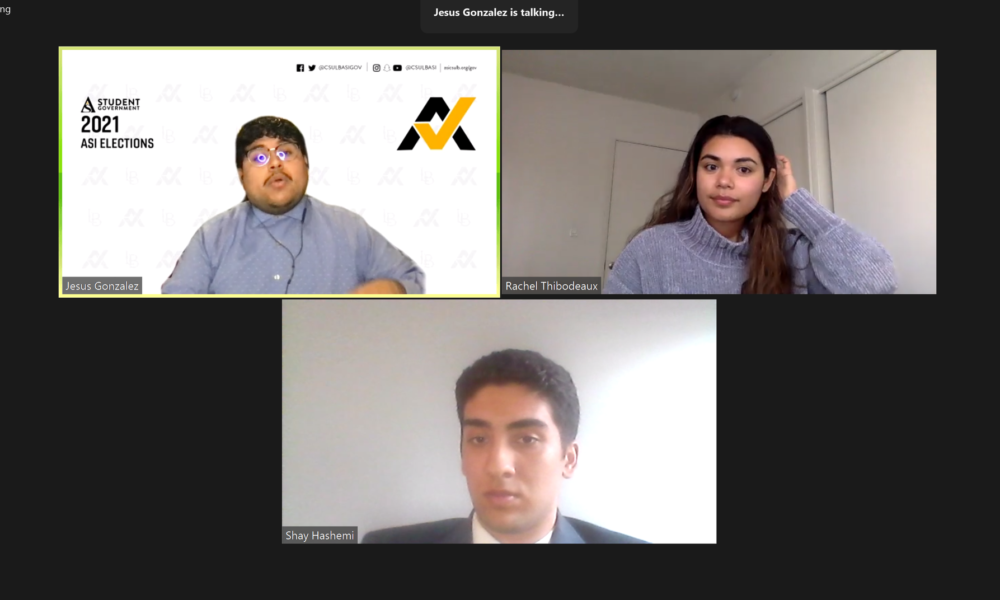Continuing with the 2021 Associated Students, Inc. elections, the two presidential candidates participated in a Zoom debate Thursday, in which they discussed issues like inclusivity, food insecurity, homelessness and student engagement in the online landscape.
Moderated by Rachel Thibodeaux of Beach Forensics, the debate featured candidates Jesus Gonzalez, senator for the Board of Control, and Shay Hashemi, vice president of the CSULB Financial Management Association.
Thibodeaux first asked the candidates how they would increase student involvement in an virtual learning environment.
In response, Hashemi said that he would create an outreach committee separate from ASI to help “unify” the three branches of student government.
“I think as chief responsibility to the organizations on campus and in students is to market the benefits of becoming involved in the university. So to do this, what I’m going to do is I’m going to completely standardize and reorganize the way ASI communicates,” Hashemi said.
Gonzalez said that he would initiate an outreach program that will allow ASI to bridge other organizations in hopes that students will join senate board meetings to discuss issues and concerns.
In rebuttal, Hashemi said he felt that meetings are not enough to engage with students and a line of communication needs to more “standardized,” to which Gonzalez replied saying he uses social media platforms to communicate with the student body.
“I continue these efforts and promoting within our social media accounts hosting Instagram lives, you know, as we also have the Student Recreation and Wellness Center events that will help students become more engaged,” Gonzalez said.
Thibodeaux moved on to ask about how the candidates could ensure the administration provides campus clubs and organizations with sufficient funding.
Acknowledging that many student organizations have limited funding, Gonzalez said he hopes to allocate a $300 grant, like the one disbursed in fall 2020, to support clubs virtual or restrictive in-person events.
“I hope that the students are able to get creative ways that we can fundraise,” Gonzalez said.
Hashemi advocated for reopening campus, while operating within Los Angeles County Public Health department guidelines under red tier citing that clubs have been losing out on revenue due to a lack of in-person events affecting recruitment. In response, Gonzalez argued that reopening the campus would risk spreading the coronavirus to students’ households and communities.
“Senator, clubs are dying,” Hashemi said. “There is always going to be a risk, there always has been a risk for whatever, me driving down the street, you can get in a car accident any day.”
The moderator then moved on to ask about how the candidates plan to retain and increase the number of students and faculty from underrepresented communities.
“One thing we have to do is to make sure that we turn to more of an equal representation not just our staff but our student leaders,” Hashemi said. “Over 60% of our students are non-male students, and yet only two people signed up to run for president, right, one person, signed up to run for vice president.”
He said he plans to develop outreach committees that would create networks with students and their organizations, similar to the university’s outreach for early academic preparation to increase diversity among faculty.
Gonzalez advocated for increasing diversity among staff to more accurately reflect each college, working closely with places like the Career Development Center, the SRWC and the Women’s and Gender Equity Center.
“What kind of systems are you going to place to actually recruit African American students and different demographic of students from our local high schools in Long Beach?” Hashemi asked Gonzalez.
In response, Gonzalez said that he works closely with the university and outreach committee to promote the importance of higher education within high school recruitment.
Moving on, Thibodeaux asked the candidates their thoughts on how students can focus on their emotional well-being and receive mental health care during the pandemic.
Gonzalez said he felt there should be an increase of Counseling and Psychological Services counselors, though he realizes that might be difficult to achieve. Instead, he suggested that different counselors talk to students depending on their background, like CAPS counselor Nidia Morán Canales, who works closely with undocumented students.
To assist students facing food insecurity, Hashemi proposed to increase awareness of ASI’s Beach Pantry program by creating pamphlets and sending newsletters.
Gonzalez replied saying that emails are already sent out to advertise issues like food and housing insecurity under the Department of Student Affairs’ Basic Needs Program. Hashemi maintained that the program, and mental health in general, needs more awareness and suggested posting a bulletin “on every single page in CSULB in the footer.”
Hashemi closed out by claiming he advocates for students who are facing issues like housing and food insecurity, and prioritizes mental health. For Gonzalez, he represents students who he feels are struggling during this time.
“My efforts basically is to support underrepresented students, the low income communities, the first generations, undocumented students, students of color, because they’re the ones who are struggling, especially during this virtual formatting,” Gonzalez said.
ASI presidential elections will be held virtually March 15 through 17.





Pingback: Newly elected ASI president promises to be voice for students - Daily Forty-Niner